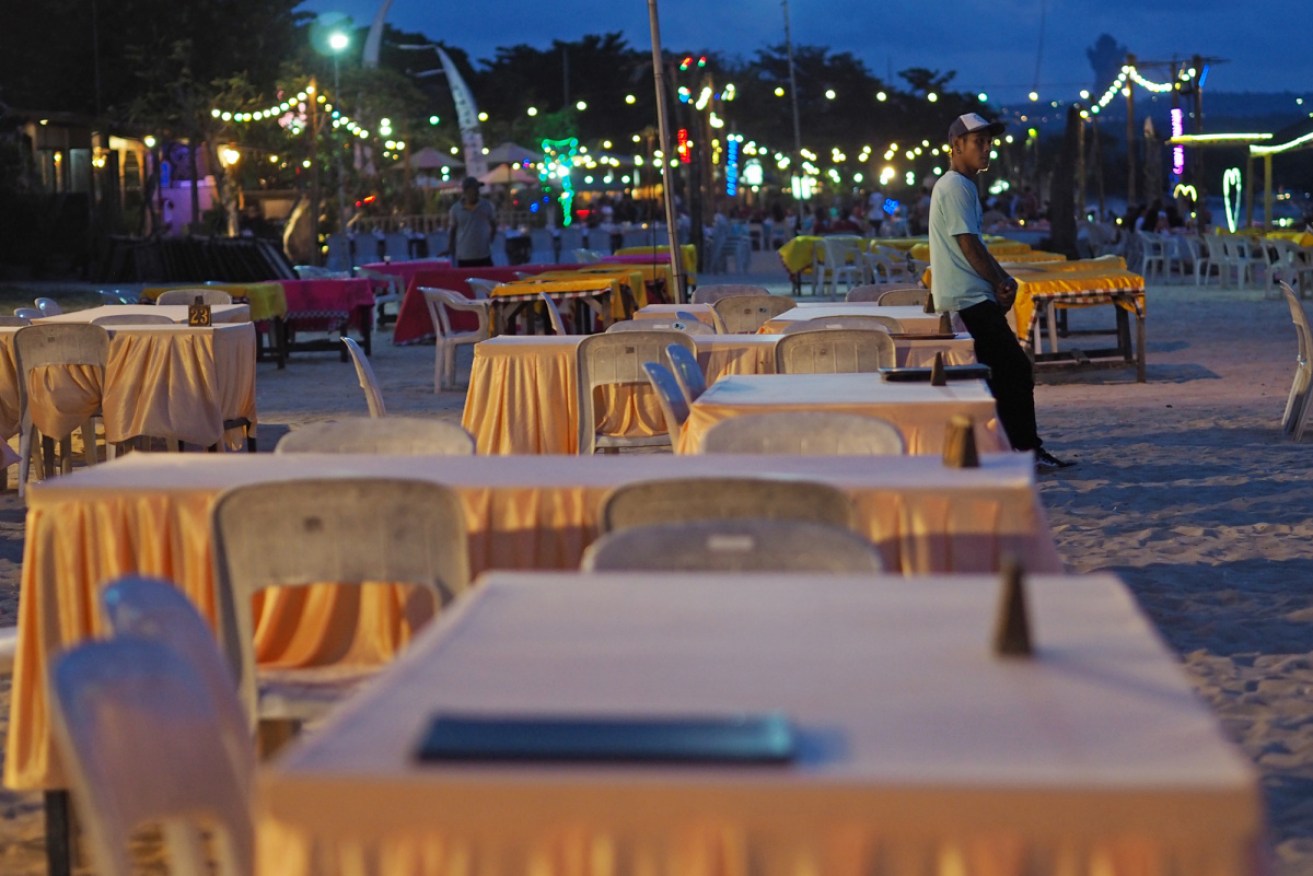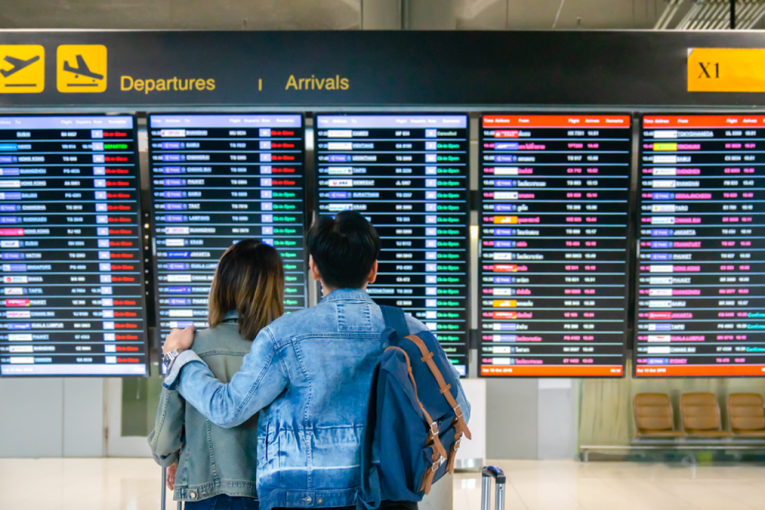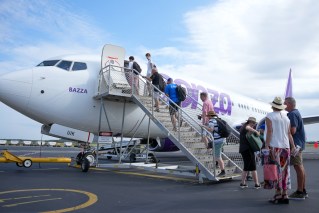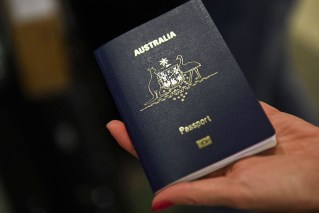Trouble in paradise: How the coronavirus crisis has hit Bali


An empty beachside restaurant in Bali – abandoned by tourists amid the coronavirus outbreak. Photo: Getty
Blood-red sunsets that take your breath away. Colourful Hindu ceremonies. Buzzing nightlife. These images are typical of the memories of the 1.1 million Australians who holiday in Bali every year.
But Bali in the age of the COVID-19 pandemic is a different place. The once-popular beach hubs of Kuta and Seminyak are ghost towns and the gnarled traffic is no more.
The island is more peaceful than it has been in decades but it’s come at a terrible price: More than 50,000 tourism and hospitality workers have been laid off or sent on unpaid leave.
With an average monthly income of only $289 and few social-welfare benefits available in Bali, the impact on many of these newly unemployed and their families has been nothing less than devastating. Many don’t have money to buy food.
“I really need a job, any kind of job, such as cleaning houses or gardening. I will do anything. My family are starving,” reads one of hundreds of similar posts on Facebook pages for expats in Bali.

A Kuta beach resort – minus the hustle and bustle of tourists and staff.
Some of the estimated 3000 Australians remaining in Bali, including chefs and restaurateurs, are answering those calls by turning their venues into free food banks – frontline charities that are feeding thousands every day.
Storo, who like many Indonesians goes by one name, used to work as a driver for a mobile billboard company. But when the pandemic struck in March, he lost his job. A week later Storo was evicted from his apartment. His old boss let him sleep in the company garage but he has no money for food.
“I found a post on Facebook about a place called Crisis Bali Kitchen that was offering free food. They fed me and gave me more food for my friends sleeping in the garage,” he says.
“You should have seen the smiles on their faces when I returned with all this food.”
Crisis Bali Kitchen is the brainchild of Brad Downes of Tropicana Churros Cafe in Seminyak.
“We sell cheap coffee and churros from a repurposed shipping container – nothing fancy,” says Mr Downes, an Australian who has lived in Bali for 15 years.
“With all the tourists gone, we didn’t want to lay off our staff. So we came up with the idea that we would stay open and use whatever little profit we could make to prepare lunch packs for people who lost their jobs in the studio next door. I assumed we’d make about $50 a day – enough to feed about 60 people.”
Within a week, the Crisis Bali Kitchen was feeding 600 people a day. To help meet demand, Mr Downes is soliciting donations on Facebook.
“It’s been heart-wrenching to see grown men crying when we give them food for their kids,” he says.
“One guy rode his scooter for four hours from east Bali just to get a meal. We gave him nine boxes – it was all he could carry.”

Empty streets and shuttered shops in the tourist hub of Kuta Beach. Photo: Getty
Fighting with nutrition
About half the volunteers at Crisis Bali Kitchen are foreigners. The rest are Indonesian, people like Storo who now spends his days delivering lunch parcels.
Then there’s Niluh, a barista at Tropicana Churros Cafe who volunteers in the crisis kitchen every day before taking on the night shift at the cafe next door.
Ten minutes drive away, in the neighbourhood of Canggu, Warung Una, a humble Indonesian restaurant, is helping feed migrant workers stranded in Bali.
“Many construction workers from Java are stuck here. They’ve lost their jobs but can’t go back home because of travel restriction or they have no money,” says Warung Una’s owner Wulan Mei Lina, who also hails from Java.
“I collected money from friends overseas and put in a little bit of my own cash to make lunch packs. On the first day, we gave away 55 meals. On the second we gave 100 and tomorrow we are going to give 150.
“My staff know I can’t pay their salaries but they don’t even ask. They’re working for free. They have hearts of gold.”

A lone tourist on a deserted Kuta beach.
Back in Seminyak, Australian restaurateur Josh Herdman had to close Sea Circus, a famous cafe with colourful murals that has been trading since 2010. But he refuses to heed the Australian government’s counsel to go home.
“This is my home. I love these people,” he says. “If the ship is going down, I feel I should go with it.”
Mr Herdman and his Balinese staff are working double-time to steady that ship.
“If you have poor nutrition, your immune system is weak and you’re more at risk from COVID-19,” he says. “So I started the Sea Circus Food Fund to raise money to make nutritious meals with meat, chicken, fish and eggs.
“On our first day, we gave out 400 meals. Today is our second day and we’re going to feed 600-800 people. But we have the capacity at Sea Circus to feed up to 3000 people a day – if people back home continue to support us.”

Food donated by Australians is helping to feed Balinese hit hard by the coronavirus downturn. Photo: Facebook
Appeals going viral
More Australian chefs and restaurateurs have heeded the call in Bali.
Simon Lefebvre, the Australian actor who played Plucka Duck on Hey Hey It’s Saturday, is giving away 100 meals a day at his Kuta restaurant, The Naughty Duck.
Australian-born chef Janet DeNeefe is using her own money and donations from Australians who have eaten at her restaurant, Casa Luna, to make food packages for retrenched staff.
“We normally have 250 employees and had to let a lot of them go. We can’t possibly afford to keep on paying them when we’re closed, but we’re giving packages with rice, sugar and commodities to about 100 homes,” she says.

Jan DeNeefe and volunteers at Casa Luna in Ubud. Photo: Supplied
Some Australians with no food and beverage experience are also cooking up storms to help feed the needy in Bali.
“When I heard there were so many people who lost their jobs, I asked all my friends on Facebook to each put in $1.50 – enough to feed 100 people,” says Amanda Rialdi, an Australian expat who is married an Indonesian.
“But then my friends started sharing the message, it went viral.”
The Let’s Help Bali (COVID-19) Facebook group that formed as a result has delivered 2000 lunch packs across Bali. But it’s just the tip of the iceberg, Ms Rialdi says.
“Yesterday we found two people sleeping in a chicken coop. A meal will help them for a moment but they need more, so we’re appealing for funds to make grocery kits with things like eggs, vegetables, toothpaste and soap to help people survive for a week or two.”
Brad Downes at Crisis Bali Kitchen is also appealing for more.
“The Balinese have welcomed people from all over the world. They have basically given up their island for tourism,” he says. “Now tourism has stopped, it’s time for us to give back.”








